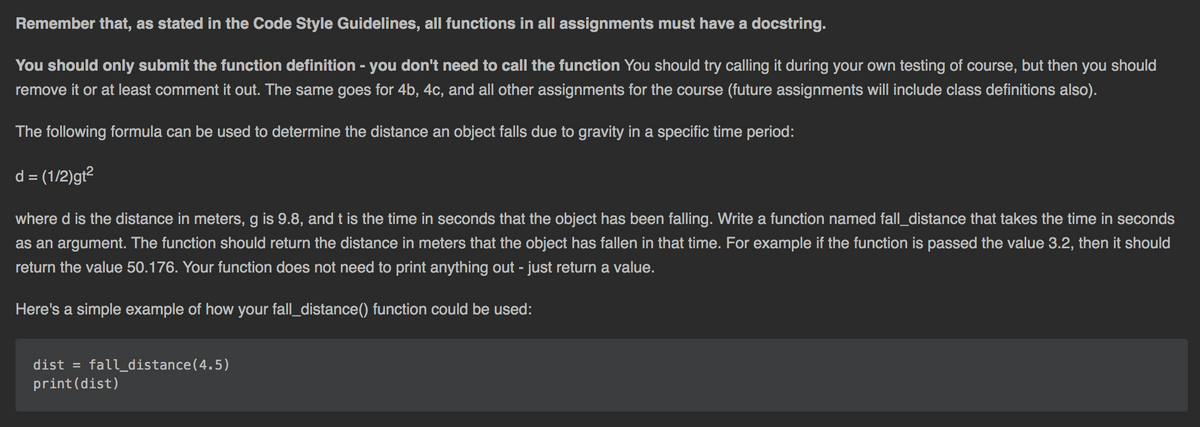Remember that, as stated in the Code Style Guidelines, all functions in all assignments must have a docstring. You should only submit the function definition - you don't need to call the function You should try calling it during your own testing of course, but then you should remove it or at least comment it out. The same goes for 4b, 4c, and all other assignments for the course (future assignments will include class definitions also). The following formula can be used to determine the distance an object falls due to gravity in a specific time period: d = (1/2)gt² where d is the distance in meters, g is 9.8, and t is the time in seconds that the object has been falling. Write a function named fall_distance that takes the time in seconds as an argument. The function should return the distance in meters that the object has fallen in that time. For example if the function is passed the value 3.2, then it should return the value 50.176. Your function does not need to print anything out - just return a value. Here's a simple example of how your fall_distance() function could be used: dist = fall_distance(4.5) print(dist)
Remember that, as stated in the Code Style Guidelines, all functions in all assignments must have a docstring. You should only submit the function definition - you don't need to call the function You should try calling it during your own testing of course, but then you should remove it or at least comment it out. The same goes for 4b, 4c, and all other assignments for the course (future assignments will include class definitions also). The following formula can be used to determine the distance an object falls due to gravity in a specific time period: d = (1/2)gt² where d is the distance in meters, g is 9.8, and t is the time in seconds that the object has been falling. Write a function named fall_distance that takes the time in seconds as an argument. The function should return the distance in meters that the object has fallen in that time. For example if the function is passed the value 3.2, then it should return the value 50.176. Your function does not need to print anything out - just return a value. Here's a simple example of how your fall_distance() function could be used: dist = fall_distance(4.5) print(dist)
C++ Programming: From Problem Analysis to Program Design
8th Edition
ISBN:9781337102087
Author:D. S. Malik
Publisher:D. S. Malik
Chapter6: User-defined Functions
Section: Chapter Questions
Problem 9SA
Related questions
Question
100%

Transcribed Image Text:Remember that, as stated in the Code Style Guidelines, all functions in all assignments must have a docstring.
You should only submit the function definition - you don't need to call the function You should try calling it during your own testing of course, but then you should
remove it or at least comment it out. The same goes for 4b, 4c, and all other assignments for the course (future assignments will include class definitions also).
The following formula can be used to determine the distance an object falls due to gravity in a specific time period:
d = (1/2)gt?
where d is the distance in meters, g is 9.8, and t is the time in seconds that the object has been falling. Write a function named fall_distance that takes the time in seconds
as an argument. The function should return the distance in meters that the object has fallen in that time. For example if the function is passed the value 3.2, then it should
return the value 50.176. Your function does not need to print anything out - just return a value.
Here's a simple example of how your fall_distance() function could be used:
dist = fall_distance(4.5)
print(dist)
Expert Solution
This question has been solved!
Explore an expertly crafted, step-by-step solution for a thorough understanding of key concepts.
This is a popular solution!
Trending now
This is a popular solution!
Step by step
Solved in 2 steps

Knowledge Booster
Learn more about
Need a deep-dive on the concept behind this application? Look no further. Learn more about this topic, computer-science and related others by exploring similar questions and additional content below.Recommended textbooks for you

C++ Programming: From Problem Analysis to Program…
Computer Science
ISBN:
9781337102087
Author:
D. S. Malik
Publisher:
Cengage Learning

C++ for Engineers and Scientists
Computer Science
ISBN:
9781133187844
Author:
Bronson, Gary J.
Publisher:
Course Technology Ptr

C++ Programming: From Problem Analysis to Program…
Computer Science
ISBN:
9781337102087
Author:
D. S. Malik
Publisher:
Cengage Learning

C++ for Engineers and Scientists
Computer Science
ISBN:
9781133187844
Author:
Bronson, Gary J.
Publisher:
Course Technology Ptr